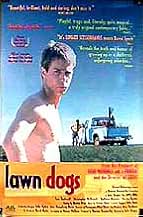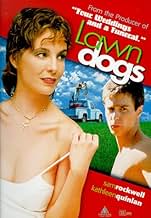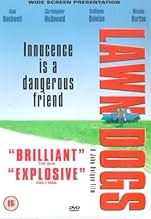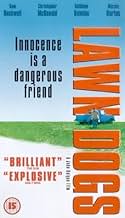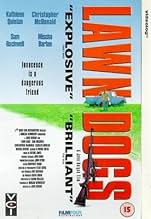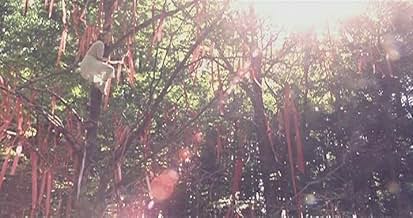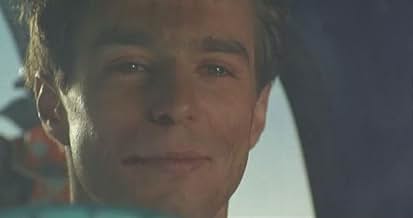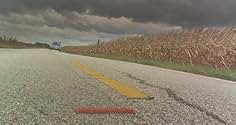CALIFICACIÓN DE IMDb
7.4/10
9.1 k
TU CALIFICACIÓN
Cuando Devon, una niña de 10 años, forja una amistad con Trent, un forastero de 21 años que corta el césped del vecindario, las cosas de repente se vuelven muy complicadas y privadas.Cuando Devon, una niña de 10 años, forja una amistad con Trent, un forastero de 21 años que corta el césped del vecindario, las cosas de repente se vuelven muy complicadas y privadas.Cuando Devon, una niña de 10 años, forja una amistad con Trent, un forastero de 21 años que corta el césped del vecindario, las cosas de repente se vuelven muy complicadas y privadas.
- Dirección
- Guionista
- Elenco
- Premios
- 7 premios ganados y 4 nominaciones en total
John Bacon
- Neighbor at Barbecue
- (sin créditos)
Khris Colgate
- Neighbor at Barbecue
- (sin créditos)
- Dirección
- Guionista
- Todo el elenco y el equipo
- Producción, taquilla y más en IMDbPro
Opiniones destacadas
Sam Rockwell is one of those actors who, no matter what role he's playing, is totally natural. He's immediately likable. I've always been a big fan of his, and up until yesterday had never before seen Lawn Dogs, one of the earliest films wherein he has a bigger role. He's very quietly, calmly good in it, and even in the scenes where he's playing and goofing around with Mischa Barton and it seems awkward, he maintains a pure, natural presence.
Lawn Dogs says something important about the most generic slice of American life, the geometrically shaped and calculated life in the suburbs. The film doesn't unmask it. Cleverly, it maintains that quiet, perpetually sunny, middle-of-nowhere feeling of a classic subdivision, and then displays a sad and maddening scenario of misunderstanding in a closed-minded, insular neighborhood and the hauntingly realistic characters. There is a bit of animal violence in this movie, but it's played out in a tautly spare way that's just as frustrating as vain, judgmental people and matter of the rest of the film.
Lawn Dogs is a refreshing sort of film. The relationship between Rockwell and Barton is heartwarming and broadly, gently natural. It's good to experience a story that altruistically communicates the genuine existence and state of mind that is often questioned and often misunderstood.
Lawn Dogs says something important about the most generic slice of American life, the geometrically shaped and calculated life in the suburbs. The film doesn't unmask it. Cleverly, it maintains that quiet, perpetually sunny, middle-of-nowhere feeling of a classic subdivision, and then displays a sad and maddening scenario of misunderstanding in a closed-minded, insular neighborhood and the hauntingly realistic characters. There is a bit of animal violence in this movie, but it's played out in a tautly spare way that's just as frustrating as vain, judgmental people and matter of the rest of the film.
Lawn Dogs is a refreshing sort of film. The relationship between Rockwell and Barton is heartwarming and broadly, gently natural. It's good to experience a story that altruistically communicates the genuine existence and state of mind that is often questioned and often misunderstood.
From the picture on the cover (see the picture on the main details page!) and reading the back of the video jacket for this movie, I expected this to be a film about suburban wives sleeping with the hired help. Nope. It's a movie about a slightly sick [in the mental and physical sense] young girl [about 10 or 11 years old?] who befriends one of the guys hired to mow the lawns in her gated community. While the guy is reluctant at first, the friendship that forms between them is actually fun to watch. That's what makes the movie interesting. But while the end has to do with the class system talked about on the video jacket, this is a story about the girl and her "lawn dog" friend, with the parents and their repressive lifestyle being almost incidental to the story until the end. This is an interesting movie to watch, but I wish the people who write the blurbs on the video jackets would actually WATCH the movies once in a while.
I am baptized in the blood, `bathtubs full,' of wild dogs, chicken dinners, and a little fairy princess. Last night I viewed "Lawn Dogs" for the second time in 5 days. I just couldn't return the tape without another look-see, even if it makes Block Buster $2 richer and me $2 poorer, for the awareness and inspiration this fairy-tale masterpiece has imbued me with are priceless. Like Trent in the film, I am alive with the hope that flight from any kind of poverty, financial or spiritual, is possible.
On the surface, the story seems to revolve around the relationship between a young man, Trent, and a little girl, Devon, and between the two struggling economic classes that they come from. But the magical cinematography throughout the film, and more than that, Devon's running fairy-tale narration, allude to a deeper meaning in the film that is revealed absolutely in the last five minutes. After all, there is nothing in the world around us that is not represented by symbols within us, and how can we tell whether the inner symbols we deal with represent things outside us, or things within us? It is natural for the world to discourage a relationship between a sexually-active male, and a prepubescent, vulnerable, hungry-for-friends female. It is also natural for the world to discourage an individual from relating to the power within himself, perhaps represented by said young female, to imagine and pursue a better life for himself, when it means he will flee the status quo that makes the rest of the world comfortable.
The setting is a highly artificial, unabashedly bourgeois, gated community in Kentucky, `Camelot Gardens' (see, we're already alluding to fairy tales), and the surrounding countryside, wherein Trent lives in a trailer, making, what can loosely be called, a "living" by mowing the lawns of the rich in Camelot Gardens. The two heroes first meet when Devon happens upon Trent's trailer while wandering into the woods to sell cookies (her capitalist parents' idea), reciting to herself a version of the Russian fairy-tale about the contest between a little girl, like herself, and the witch named `Baba Yaga.' She continues her relationship with the at-first-reluctant Trent, as he continues to mow her parents' lawn. Whom she identifies Baba Yaga with, that is, who is evil in the world, evolves with the story. In the end, she realizes where the true evil lies, and uses the magic charms of her youthful idealism to aid the flight of the oppressed.
I really enjoyed this film. It not only inspires hope, but also possesses a depth sorely lacking in the majority of American films. Much of the symbolism in the story seems to be lifted directly from classical mythology: From the open nakedness of both heroes in the beginning, a necessary reduction of the self to its bare essentials before it can be remade into something new, Trent holding up traffic to dive naked from a one-lane bridge into the local river, a kind of spectacular baptism into a new beginning, and Devon removing her nightgown to bay from her rooftop, like some essential mythic beast imploring the gods of night; to the adorning, i.e. honoring, of the tree outside the door of Trent's trailer, the Sacred Tree, Ygdrasil, the Tree of Life, so honoring life itself, and the demands that life makes of us; to the maenadic frenzy of the dancing chicken feet, a maddening after-chicken-death/chicken-dinner dithyramb; to Trent's conquest over the infernal hound, a Doberman named `Tracker,' who guards the homes of Camelot Gardens, and perhaps guards as well the path to personal power, the hound who, like Cerberus, turns away all cowards (chickens) from the inner realms; to the magic towel and comb of divine deliverance (more on these two symbols below) at the end; the story is full of age-old symbols that affect us deeply, transforming us or renewing us, without our knowing how.
The following passage is taken from Marie-Louise von Franz's `Interpretation of Fairy Tales.' It will help the reader to understand the meaning of the magic comb and towel. (In von Franz's story, a red handkerchief substitutes for the towel.)
Says von Franz:
The girl runs, throwing her magic comb and her red handkerchief behind her. Bestrewing one's trail with objects is characteristic of the magic flight. This act of throwing away things of value is a sacrifice; one throws things over one's shoulder to the dead, or to spirits, or to the devil, to propitiate those whom we dare not face. It may seem panicky to abandon valuable possessions when one is escaping, but one who stiffens himself into a defensive attitude is easily cut down by an assailant stronger than himself, whereas stripping oneself gives mobility. There are situations in which one absolutely has to give up wanting anything, and in this way one slips out from under; one is not there any longer, so nothing more can go wrong. When one is confronted by a hopelessly wrong situation, one must just make a drastic leap to the bottom of passive simplicity, and from there one can live it out.
What is more, the objects which have been sacrificed generally transform themselves into obstacles for the pursuer. The comb at once turns into a forest and becomes a part of nature the hair of mother earth. Its transformation into a natural object suggests that originally it was an integral part of nature. Actually, there is no thought or instrument or object that has not originated from nature; that is, from the unconscious psyche. One sacrifices to the unconscious what once was wrested from it.
The comb is used to arrange and confine the hair. Hair is a source of magic power or mana. Ringlets of hair, preserved as keepsakes, are believed to connect one individual with another over a distance. Cutting the hair and sacrificing it often means submission to a new collective state a giving up and a rebirth. The coiffure is frequently an expression of a cultural Weltanschauung. Primitive folk tales speak of demons being deloused and combed when they are caught, which means that the confusion in the unconscious has to be straightened out, ordered, and made conscious. Because of this meaning, hair in wild disarray is often dreamed of at the start of an analysis. The comb, therefore, represents a capacity for making one's thoughts ordered, clear, and conscious.
The red handkerchief that the girl gives up becomes a flame soaring from earth to heaven. To abandon the staff and comb meant not attempting to marshal herself or to think out a plan. Now the flame indicates that she puts an inner distance between herself and her feelings and emotions. She is reduced to a passive simplicity.
In the tale, the gaping jaws devour the forest and spit water on the flame. Water and fire battle in the unconscious, and in the meantime the girl escapes between the opposites.
On the surface, the story seems to revolve around the relationship between a young man, Trent, and a little girl, Devon, and between the two struggling economic classes that they come from. But the magical cinematography throughout the film, and more than that, Devon's running fairy-tale narration, allude to a deeper meaning in the film that is revealed absolutely in the last five minutes. After all, there is nothing in the world around us that is not represented by symbols within us, and how can we tell whether the inner symbols we deal with represent things outside us, or things within us? It is natural for the world to discourage a relationship between a sexually-active male, and a prepubescent, vulnerable, hungry-for-friends female. It is also natural for the world to discourage an individual from relating to the power within himself, perhaps represented by said young female, to imagine and pursue a better life for himself, when it means he will flee the status quo that makes the rest of the world comfortable.
The setting is a highly artificial, unabashedly bourgeois, gated community in Kentucky, `Camelot Gardens' (see, we're already alluding to fairy tales), and the surrounding countryside, wherein Trent lives in a trailer, making, what can loosely be called, a "living" by mowing the lawns of the rich in Camelot Gardens. The two heroes first meet when Devon happens upon Trent's trailer while wandering into the woods to sell cookies (her capitalist parents' idea), reciting to herself a version of the Russian fairy-tale about the contest between a little girl, like herself, and the witch named `Baba Yaga.' She continues her relationship with the at-first-reluctant Trent, as he continues to mow her parents' lawn. Whom she identifies Baba Yaga with, that is, who is evil in the world, evolves with the story. In the end, she realizes where the true evil lies, and uses the magic charms of her youthful idealism to aid the flight of the oppressed.
I really enjoyed this film. It not only inspires hope, but also possesses a depth sorely lacking in the majority of American films. Much of the symbolism in the story seems to be lifted directly from classical mythology: From the open nakedness of both heroes in the beginning, a necessary reduction of the self to its bare essentials before it can be remade into something new, Trent holding up traffic to dive naked from a one-lane bridge into the local river, a kind of spectacular baptism into a new beginning, and Devon removing her nightgown to bay from her rooftop, like some essential mythic beast imploring the gods of night; to the adorning, i.e. honoring, of the tree outside the door of Trent's trailer, the Sacred Tree, Ygdrasil, the Tree of Life, so honoring life itself, and the demands that life makes of us; to the maenadic frenzy of the dancing chicken feet, a maddening after-chicken-death/chicken-dinner dithyramb; to Trent's conquest over the infernal hound, a Doberman named `Tracker,' who guards the homes of Camelot Gardens, and perhaps guards as well the path to personal power, the hound who, like Cerberus, turns away all cowards (chickens) from the inner realms; to the magic towel and comb of divine deliverance (more on these two symbols below) at the end; the story is full of age-old symbols that affect us deeply, transforming us or renewing us, without our knowing how.
The following passage is taken from Marie-Louise von Franz's `Interpretation of Fairy Tales.' It will help the reader to understand the meaning of the magic comb and towel. (In von Franz's story, a red handkerchief substitutes for the towel.)
Says von Franz:
The girl runs, throwing her magic comb and her red handkerchief behind her. Bestrewing one's trail with objects is characteristic of the magic flight. This act of throwing away things of value is a sacrifice; one throws things over one's shoulder to the dead, or to spirits, or to the devil, to propitiate those whom we dare not face. It may seem panicky to abandon valuable possessions when one is escaping, but one who stiffens himself into a defensive attitude is easily cut down by an assailant stronger than himself, whereas stripping oneself gives mobility. There are situations in which one absolutely has to give up wanting anything, and in this way one slips out from under; one is not there any longer, so nothing more can go wrong. When one is confronted by a hopelessly wrong situation, one must just make a drastic leap to the bottom of passive simplicity, and from there one can live it out.
What is more, the objects which have been sacrificed generally transform themselves into obstacles for the pursuer. The comb at once turns into a forest and becomes a part of nature the hair of mother earth. Its transformation into a natural object suggests that originally it was an integral part of nature. Actually, there is no thought or instrument or object that has not originated from nature; that is, from the unconscious psyche. One sacrifices to the unconscious what once was wrested from it.
The comb is used to arrange and confine the hair. Hair is a source of magic power or mana. Ringlets of hair, preserved as keepsakes, are believed to connect one individual with another over a distance. Cutting the hair and sacrificing it often means submission to a new collective state a giving up and a rebirth. The coiffure is frequently an expression of a cultural Weltanschauung. Primitive folk tales speak of demons being deloused and combed when they are caught, which means that the confusion in the unconscious has to be straightened out, ordered, and made conscious. Because of this meaning, hair in wild disarray is often dreamed of at the start of an analysis. The comb, therefore, represents a capacity for making one's thoughts ordered, clear, and conscious.
The red handkerchief that the girl gives up becomes a flame soaring from earth to heaven. To abandon the staff and comb meant not attempting to marshal herself or to think out a plan. Now the flame indicates that she puts an inner distance between herself and her feelings and emotions. She is reduced to a passive simplicity.
In the tale, the gaping jaws devour the forest and spit water on the flame. Water and fire battle in the unconscious, and in the meantime the girl escapes between the opposites.
Sam Rockwell has been had. He lit up the screen in "Box of Moonlight," is a major player in the upcoming "Midsummer Night's Dream," and yet he didn't get equal billing for screen time in either of those films. What gives? In "Lawn Dogs" Rockwell is stunning as the lawn boy who accepts a little "rich" girl as a friend and gives her a new view of the world. The movie is rich in atmosphere and color. The central Southern United States has rarely appeared so docile and yet so menacing. Every time I thought I knew where "Lawn Dogs" was going...it pulled another pleasant surprise. Mischa Barton is amazing as Devon Stockard, the little girl with more on her mind than selling cookies. This is truly one of the best American films of the 90's. If you like off-beat slices of America with a twisted view, then "Lawn Dogs" is the best movie you'll see in a long time. It is quite simply full of the magic, menace and imagination alive in the heads and hearts of little girls...about to become young women. Oh yeah, and give Sam Rockwell his due!
This superb film, directed by John Duigan, the gifted director of THE YEAR MY VOICE BROKE, is about a friendship between a young girl (Mischa Barton of "The OC") and a free-spirited young, adult man (Sam Rockwell).
It's self-aware enough to acknowledge the inherent sensitivity of its subject matter, but it doesn't cave into conservative conclusions about how such a relationship ought to be portrayed.
At heart, LAWN DOGS is about trust, not the death of innocence or the festering political correctness all around us that sees danger in every unconventional relationship. It does touch on the subject of sexual abuse, but it doesn't come at it from the angle you'd suspect...and that's the whole point, isn't it? Sexual abuse, for the most part, usually visits as someone you've known well enough to trust completely.
Beyond its politics, this is a unique, bracing fantasy that is more European than American (or Australian) in its view world both morally and visually. The climax is an unexpected treat and its moral resolution arrives just in the nick of time.
Sumptuously photographed and written with great intelligence by Naomi Wallace, it dares to be erotic, provoking, unconventional and incisive.
Don't pass it up if you get an offer.
It's self-aware enough to acknowledge the inherent sensitivity of its subject matter, but it doesn't cave into conservative conclusions about how such a relationship ought to be portrayed.
At heart, LAWN DOGS is about trust, not the death of innocence or the festering political correctness all around us that sees danger in every unconventional relationship. It does touch on the subject of sexual abuse, but it doesn't come at it from the angle you'd suspect...and that's the whole point, isn't it? Sexual abuse, for the most part, usually visits as someone you've known well enough to trust completely.
Beyond its politics, this is a unique, bracing fantasy that is more European than American (or Australian) in its view world both morally and visually. The climax is an unexpected treat and its moral resolution arrives just in the nick of time.
Sumptuously photographed and written with great intelligence by Naomi Wallace, it dares to be erotic, provoking, unconventional and incisive.
Don't pass it up if you get an offer.
¿Sabías que…?
- TriviaRandy Peterson, the stuntman who doubled for Sam Rockwell in the dive off the bridge early in the film, performed the stunt a total of six times - five times completely naked, and once wearing briefs (in case an alternative shot would be needed for a US TV version). The bridge (in Louisville, Kentucky, USA) was 30 feet high and the water around nine feet deep.
- ErroresWhen Devon pours a glass of water for Trent it is less than half full. In the next scene outside it is seen to be more than half full even after splashing it about.
- Versiones alternativasFor showing on US television, all of the profanity was dubbed over with less extreme words, the sex scene between Trent and Pam (at around 20 minutes in) used an alternate take where they are wearing clothes as opposed to them being nude in the original, and the scene where Trent dives off the bridge completely naked (at around 10 minutes in) used an alternate take with him (actually a stunt man) wearing underwear. The alternate takes were filmed with the intention of this being shown on TV in the US. The version streaming on several internet services (Amazon, Tubi, etc.) is this censored TV version.
- ConexionesReferenced in Padre soltero (2004)
- Bandas sonorasShake And Shiver
Performed by Jubilee
Courtesy of Silvertone Records, Ltd.
Written by Ross Baxter, Chris Holditch, Garron Firth and Lee Severin (as Baxter/Frith/Holdich/Severin
Used by permission of Zomba Music Publishers Ltd.
Selecciones populares
Inicia sesión para calificar y agrega a la lista de videos para obtener recomendaciones personalizadas
- How long is Lawn Dogs?Con tecnología de Alexa
Detalles
Taquilla
- Presupuesto
- USD 8,000,000 (estimado)
- Total en EE. UU. y Canadá
- USD 106,404
- Fin de semana de estreno en EE. UU. y Canadá
- USD 22,491
- 17 may 1998
- Total a nivel mundial
- USD 106,404
- Tiempo de ejecución1 hora 41 minutos
- Mezcla de sonido
- Relación de aspecto
- 1.85 : 1
Contribuir a esta página
Sugiere una edición o agrega el contenido que falta

Principales brechas de datos
By what name was Lawn Dogs (1997) officially released in India in English?
Responda

